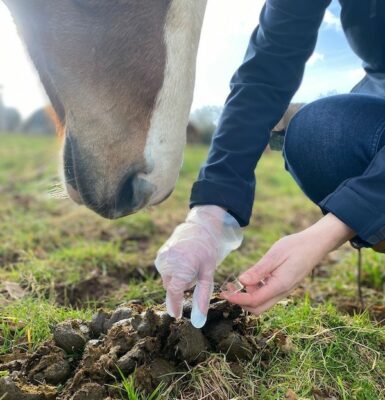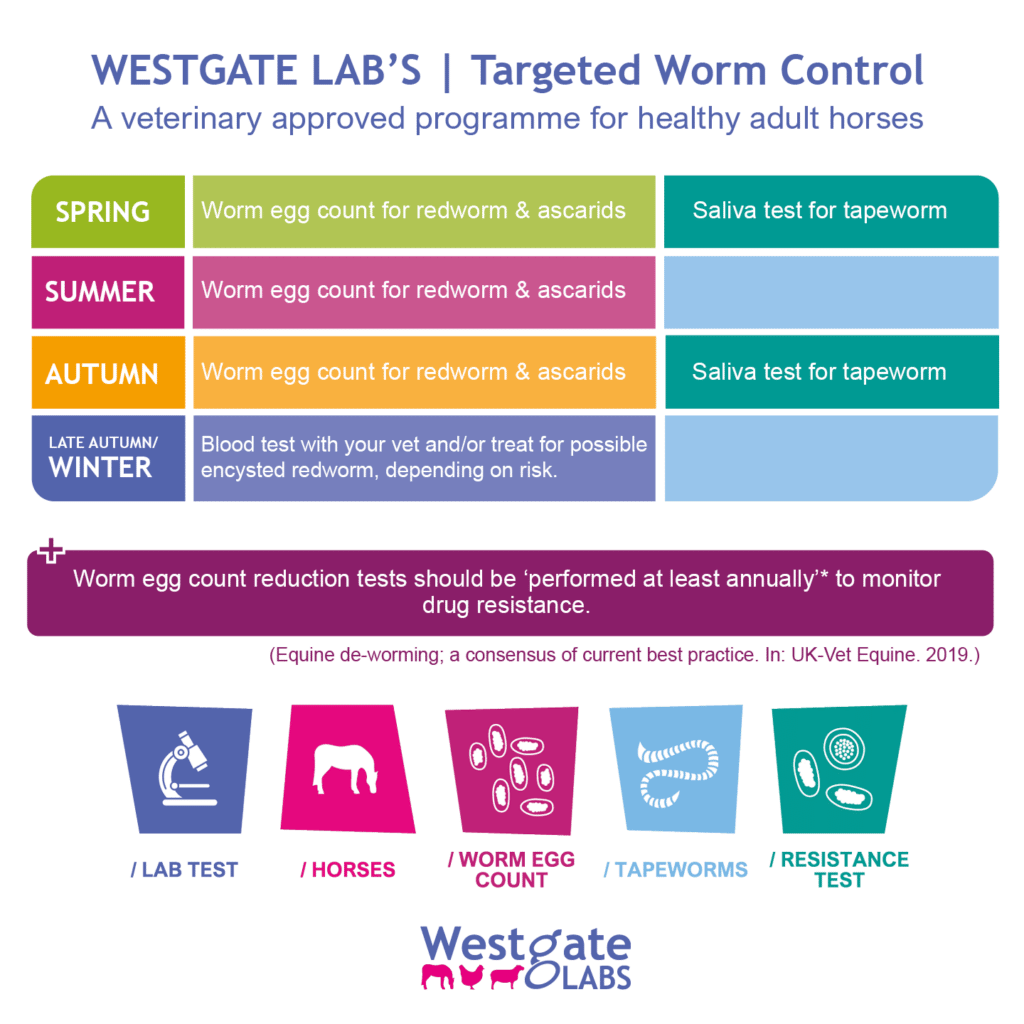Veterinary, Worming
How to plan a strategic worm control programme
The Horse Hub talks to Westgate Laboratories to find the best approach to deworming our horses
Good worm control starts with knowing which parasites could be a threat to horse health at which times of year and using worm counts and tests to monitor infection levels in the horse, only adding wormer doses as they are needed. Combine this with pasture management and animal husbandry techniques to reduce the parasite challenge to your horse.
There are two tests that should form the basis of an effective targeted worm control programme – worm egg counts for redworm and ascarids every 8-12 weeks and the EquiSal saliva test for tapeworm every 6 months.
These guidelines are based on the lifecycle of the parasites we’re testing for. Both tests give results that can be used to determine whether the horse needs treatment or not.
We then need to consider encysted stages of the small redworm once per year in the late autumn/winter and also bots, pinworm, lungworm and liver fluke if you suspect a problem.
A suggested programme
We’re not trying to eradicate all worms as this is impossible. A mature, healthy horse can deal well with a low level of parasites and can follow a very simple pattern of testing and dosing. Treatment is then recommended if the tests indicate infection above a certain level that could cause disease. Foals, youngsters, neglected or older horses will require more attention.
The following programme is a good basis for a healthy adult horse:
| SPRING | Worm egg count for redworm and ascarids | Saliva test for tapeworm |
| SUMMER | Worm egg count for redworm and ascarids | |
| AUTUMN | Worm egg count for redworm and ascarids | Saliva test for tapeworm |
| WINTER | Blood test with your vet or worm for possible encysted redworm. |
“We can no longer give a wormer and expect it to work; worm egg count reduction tests should be performed at least annually to monitor chemical resistance”
Encysted stages of redworm are not mature so don’t lay the eggs which are counted in the dung sample. It is therefore important to address these in the winter months (December to February). If your horse is low risk (worm egg count results of less than 200epg over the previous year then they may be a candidate for the blood test that will detect these larval stages. Otherwise treat with a suitable product. Every horse that does not require a moxidectin dose is helping preserve to the chemical and delay resistance.

Once you have a result – what next?
It’s not only the test itself but what we do with it that counts. An explanation will be given by the laboratory to help you decide whether to worm or not. You can seek further advice from your vet, SQP or animal pharmacist. They will want to discuss your horse’s test results in the context of worming history and general health and can then advise on an appropriate wormer to use if this is required.
Worm egg counts identify any parasites present and return a reading of eggs per gram which fall into categories of low, medium and high. A low count for most horses will not need treatment. At medium level we’d recommend worming is required and if the count falls into the higher level treatment is required and you may also want to look at management to look at ways to break the lifecycle of the worms mechanically.
- Good pasture management and animal husbandry techniques will also help to reduce your horse’s worm burden:
- If possible keep horses with the same grazing companions, not constantly changing groups.
- Poo-pick as much as you can, at least twice a week to keep parasite levels down.
- Keep stables, buckets and communal areas clean. Disinfect from time to time.
- Rest and rotate grazing and don’t overcrowd fields.
- Cross graze pasture with other species eg. sheep.
- Keep new horses separate until tested and treated accordingly.
- Don’t worm and move; after worming ensure horses stay on the same pasture for a few days to help slow down resistance.
- When first starting to use a targeted worming programme all horses should be tested, at a point when worming is due or slightly overdue, so as to get a true result.
A veterinary view
Carolyn Cummins MVB Phd MRCVS, consultant vet to Westgate Laboratories, gives her view on the importance of good parasite control.

Working as a first opinion equine vet I see a wide and varied caseload. Every year this includes horses that are suffering from a severe worm burden. In some circumstances this is due to neglect or other underlying illnesses. More worryingly, in others, these are horses with owners who believe that they are worming their horses appropriately.
In these horses problems can arise from worming at the wrong times of year, not using the appropriate wormer, under-dosing, or overuse of a particular wormer leading to resistance so that the drugs we have are no longer effective against the parasites that are a threat to horse health.
A horse suffering with a severe worm burden can go from an apparently healthy horse to a severely ill one in a very short space of time, hence the importance of a regular testing regime.
